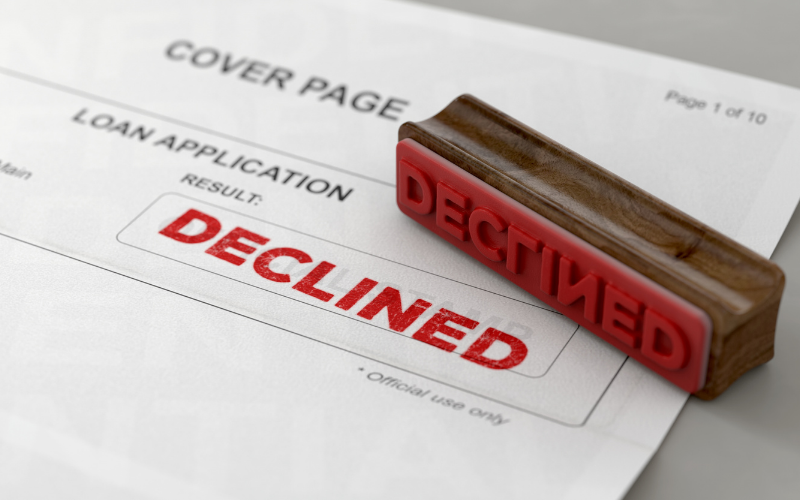Why Did My Application For A Refinance Get Turned Down?
 If you want to save money on your home loan, you might want to refinance. During the refinancing process, you could secure a better interest rate on your home loan. You could also withdraw cash from your home’s equity value to cover other expenses. Similar to a regular mortgage application, some refinance applications are denied. Why is this the case, and what should you do next?
If you want to save money on your home loan, you might want to refinance. During the refinancing process, you could secure a better interest rate on your home loan. You could also withdraw cash from your home’s equity value to cover other expenses. Similar to a regular mortgage application, some refinance applications are denied. Why is this the case, and what should you do next?
Your Debt To Income Ratio Is Off
One of the most common reasons why an application for a home refinance is turned down is that the applicant has too much debt. The lender will not want to refinance a homeowner who has too much existing debt. If you have credit card debt, car loans, or student loans, you may want to pay down some of this existing debt before you apply for a refinance.
Your Credit Score Is Too Low
Your credit score is still going to play a significant role in your application for a refinance. If your credit score has gone down since you purchased the house, you may have a difficult time refinancing. You should always request a copy of your credit report and correct any issues on that report before you decide to apply for a refinance.
Your Home Value Has Gone Down
The lender may also deny your application for a refinance if your home has gone down in value. Your home is used as collateral for the loan. If the home has gone down in value, the lender might be worried that the value of the home may not pay off the balance of the loan in the event you start missing payments. You may have to wait for the home’s value to go back up before you can refinance.
Work With A Professional Team
If you want to refinance your home, it can be frustrating if your application gets denied. Fortunately, that doesn’t mean you cannot apply again. You should work with a professional team that can take a look at your refinance application, figure out why the application was turned down, and rectify the situation. Sometimes, an application is turned down simply because the lender doesn’t have enough information or the application was not filled out properly.

 If you want to save money on your home loan, you may want to consider refinancing. During the refinancing process, you will replace your existing home loan with a new one; however, you want to secure the lowest interest rate possible. How can you get a better rate on your mortgage during the refinancing process?
If you want to save money on your home loan, you may want to consider refinancing. During the refinancing process, you will replace your existing home loan with a new one; however, you want to secure the lowest interest rate possible. How can you get a better rate on your mortgage during the refinancing process?  There is so much to know when it comes to homeownership that even wading into all of the information can seem overwhelming, but if there’s one thing you need when the time comes to purchasing a home, it’s to be prepared. Here are a few ways that you can ensure you’re ready for what a mortgage entails so that buying your dream home will be a positive experience you won’t regret.
There is so much to know when it comes to homeownership that even wading into all of the information can seem overwhelming, but if there’s one thing you need when the time comes to purchasing a home, it’s to be prepared. Here are a few ways that you can ensure you’re ready for what a mortgage entails so that buying your dream home will be a positive experience you won’t regret. Smart homebuyers know that mortgage rates and terms can vary widely among lenders. While your credit score and history will influence what rates and terms you’re offered, there’s a wide range of flexibility, which means shopping around for a pre-approval makes sense. At the same time, it’s important to minimize credit inquiries to protect your credit rating.
Smart homebuyers know that mortgage rates and terms can vary widely among lenders. While your credit score and history will influence what rates and terms you’re offered, there’s a wide range of flexibility, which means shopping around for a pre-approval makes sense. At the same time, it’s important to minimize credit inquiries to protect your credit rating. There are many people who are interested in purchasing a home for the first time. Even though many first-time homeowners are interested in the sticker price of a home, it is just as important to consider credit scores. Anyone who requires financing to purchase a home will have to go through a credit check. What credit score is considered high enough for a home loan? What do people have to do if they want to increase their credit scores?
There are many people who are interested in purchasing a home for the first time. Even though many first-time homeowners are interested in the sticker price of a home, it is just as important to consider credit scores. Anyone who requires financing to purchase a home will have to go through a credit check. What credit score is considered high enough for a home loan? What do people have to do if they want to increase their credit scores?